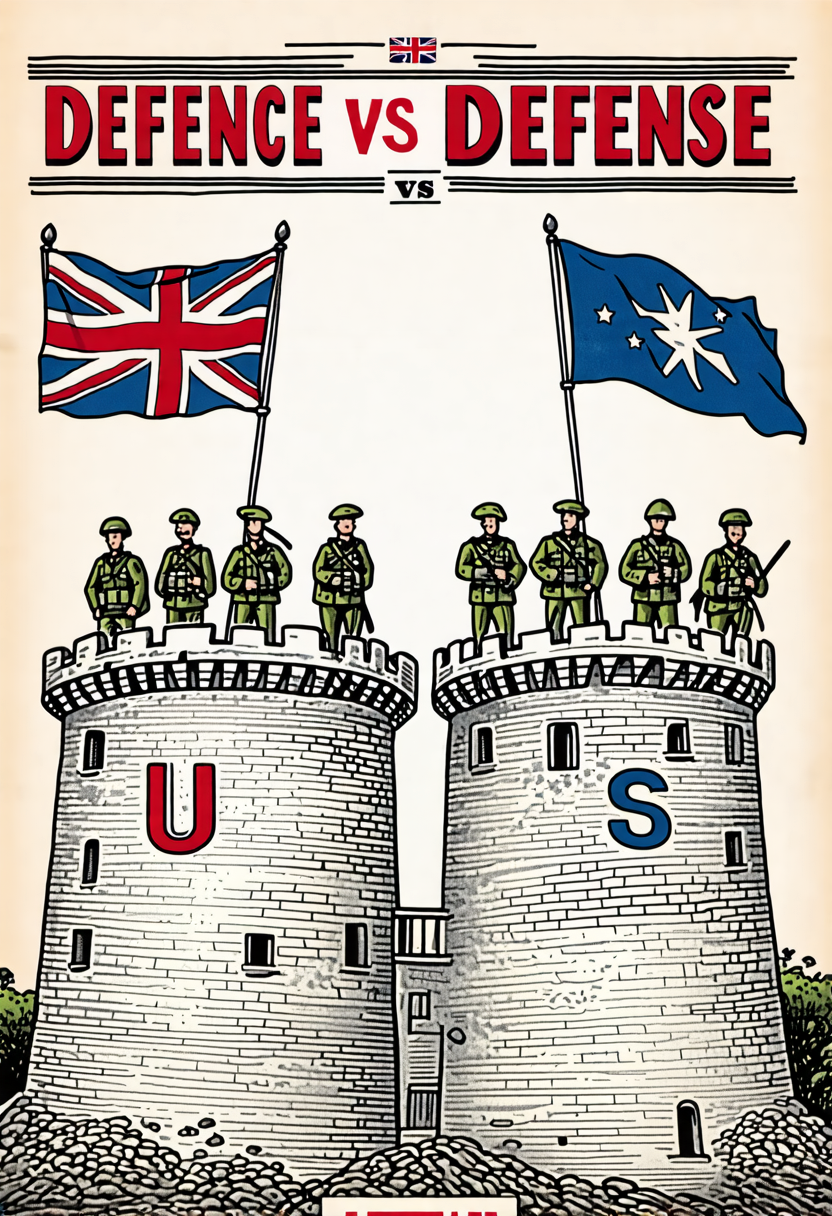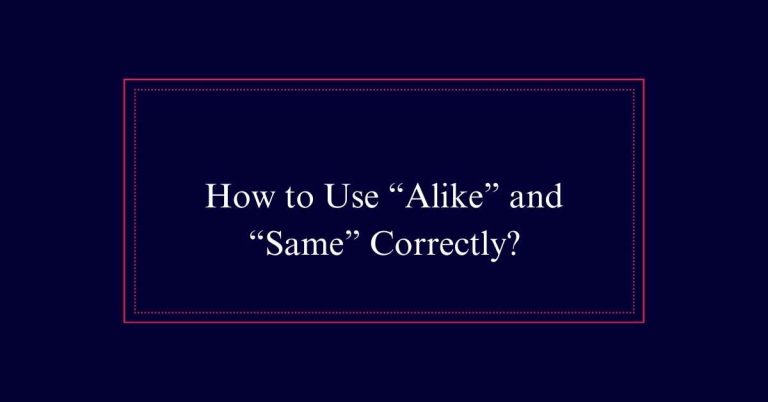Defence Vs. Defense
The choice between “defence” and “defense” depends on regional spelling conventions. “Defence” is used in British English, while “defense” is the American English variant. British publications and documents maintain “defence,” reflecting historical preferences. In contrast, American texts use “defense” for consistency. The same rule applies to inflected forms like “defenceless” (British) vs. “defenseless” (American).
Spelling Guidelines
When discussing the spelling of ‘defence’ and ‘defense,’ it is important to recognize the differences between British and American English conventions.
In British English, ‘defence’ is the correct spelling, while American English uses ‘defense.’ These variations are standard and region-specific.
The difference extends to related words, such as ‘defenceless’ in British English and ‘defenseless’ in American English.
Additionally, ‘defense’ in American English can function as a verb, especially in sports contexts, whereas British English mainly uses it as a noun.
Understanding these guidelines helps maintain clarity in writing and ensures that the text aligns with the regional spelling norms of the target audience.
Therefore, choosing the correct form is essential for effective communication.
British English Usage
In British English, the term ‘defence’ is commonly used, adhering to traditional spelling conventions. This spelling reflects the historical and cultural preferences of the United Kingdom and other Commonwealth nations.
The ‘c’ in ‘defence’ aligns with other British spellings such as ‘offence‘ and ‘licence.’ These conventions have been maintained to preserve linguistic heritage and consistency.

British publications, academic papers, and official documents will mostly use ‘defence.’ This includes contexts ranging from military discussions to sports commentary.
Understanding this preference is essential for writers and professionals communicating with a British audience. Consistent use of ‘defence’ enhances readability and aligns with regional expectations, ensuring that the text resonates appropriately with its intended readership.
American English Usage
American English mostly uses the term ‘defense,’ reflecting a simplified spelling convention. This choice aligns with the broader pattern in American English to favor simpler spellings over their more complex British counterparts.
The term ‘defense’ is used in various contexts, from legal settings to sports. It includes areas like self-defense, national defense, and team defense in games. The preference for ‘defense’ over ‘defence’ helps maintain uniformity in American publications and communications.
Understanding this distinction is important for writers and editors working in or targeting American audiences. Using ‘defense’ correctly promotes clarity and professionalism in writing, aligning with the expectations of American readers.
Inflected Forms
Inflected forms of ‘defence’ and ‘defense’ also reflect the spelling differences between British and American English. In British English, inflected forms such as ‘defenceless’ maintain the ‘c’ spelling. Conversely, American English uses ‘defenseless’ with an ‘s’. These differences extend to other forms like ‘defencive’ vs. ‘defensive’. Understanding these variations is vital for writing clarity and regional accuracy. Below is a table illustrating inflected forms in both dialects.
| Inflected Form | British English | American English |
|---|---|---|
| Noun | Defence | Defense |
| Adjective | Defencive | Defensive |
| Without Defense | Defenceless | Defenseless |
| Adverb | Defencively | Defensively |
| Plural | Defences | Defenses |
Sports Context
Sports terminology often highlights the regional spelling differences between ‘defence’ and ‘defense.’ In the UK, ‘defence’ is the norm, and it appears frequently in sports commentary, articles, and analysis. For example, British football commentators might discuss a team’s ‘solid defence’ during a match.
Conversely, in the US, ‘defense’ is standard, especially in sports like American football and basketball. Coaches and analysts frequently talk about a team’s ‘defense strategy’ or ‘defensive plays.’ These differences are not just about spelling but reflect cultural variations in sports language.
Real-World Examples
Real-world examples provide clarity on the regional usage of ‘defence’ and ‘defense.’ British and American publications often show this difference clearly. Consider the examples below:
| Region | Example |
|---|---|
| United Kingdom | ‘The UK’s Ministry of Defence announced new cybersecurity measures.’ |
| United States | ‘The Department of Defense released its annual budget report.’ |
| United Kingdom | ‘Liverpool’s defence was praised in the match against Manchester City.’ |
| United States | ‘The defense attorney argued vigorously in court.’ |
Sentence Usage
Selecting the accurate spelling of ‘defence’ or ‘defense’ is essential for guaranteeing clarity and professionalism in your writing.
In British English, use ‘defence’ to maintain regional accuracy. For example, ‘The country’s defence strategy was updated last year.’
In American English, ‘defense’ should be used, as in ‘The team’s defense was strong throughout the game.’
Understanding the target audience helps in choosing the correct form. Use context-specific examples to illustrate your choice, such as ‘The lawyer’s defense was well-prepared’ for legal contexts.
Maintain consistent usage throughout your text to avoid confusion.
Consistency in Writing
Ensuring consistency in the use of ‘defence’ or ‘defense’ is important for maintaining clarity and professionalism in your writing. Consistent spelling helps avoid confusion and keeps the reader focused on the content rather than the discrepancies in language.
When you choose one spelling, stick with it throughout your document. This uniformity demonstrates attention to detail and respect for your audience. Moreover, it enhances the readability and coherence of your work.
In professional contexts, inconsistencies can undermine credibility. So, always decide on either the British ‘defence’ or the American ‘defense’ based on your target audience and maintain that choice. This simple practice contributes significantly to the overall quality and professionalism of your writing.
Regional Preferences
In various regions, the preference for ‘defence’ or ‘defense’ often aligns with the predominant form of English used. British English typically utilizes ‘defence’ due to historical spelling conventions. Conversely, American English favors ‘defense’ as a simplified variant.
In other English-speaking regions, the choice between ‘defence’ and ‘defense’ can depend on whether British or American English influences are stronger. Understanding these regional preferences is important for effective communication. Writers should adapt their spelling based on the intended audience or publication location.
This consideration guarantees that the text is appropriate and resonates well with readers, enhancing clarity and professionalism. Therefore, knowing the regional spelling conventions is essential for precise and effective writing.
Writing Style Impact
Understanding regional spelling conventions not only aids in effective communication but also has a profound impact on the overall writing style. Writers must consider how the choice between ‘defence’ and ‘defense’ affects the tone and professionalism of their text. Consistency is key to maintaining coherence.
| British English | American English | Context |
|---|---|---|
| Defence | Defense | General usage |
| Defenceless | Defenseless | Adjectives |
| Defence | Defense | Legal documents |
| Defence | Defense | Academic writing |
| Defence | Defense | Sports journalism |







